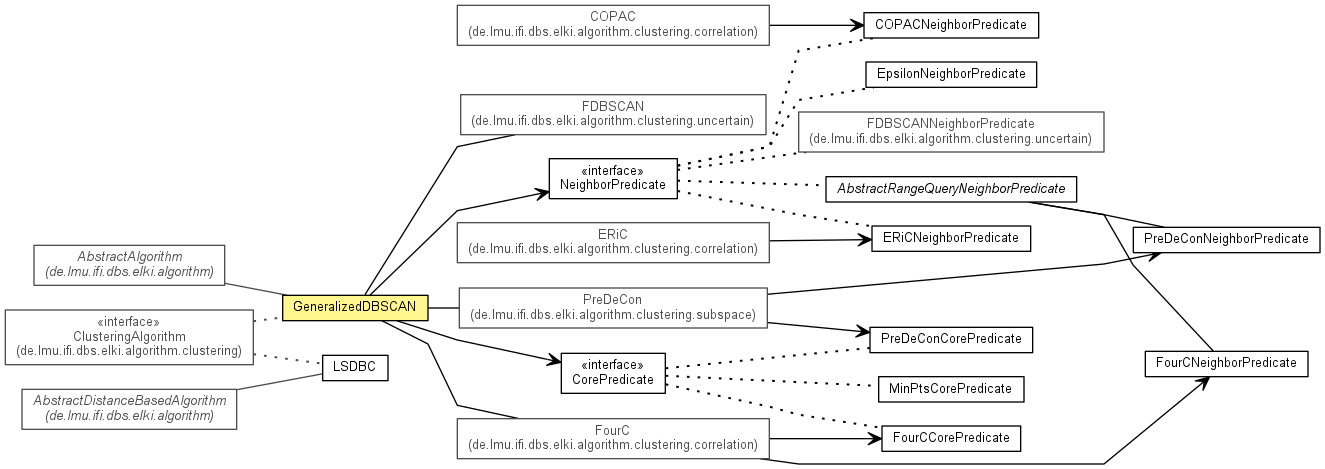- Overview
- Package
- Class
- Use
- Tree
- Deprecated
- Index


| Interface | Description |
|---|---|
| CorePredicate |
Predicate for GeneralizedDBSCAN to evaluate whether a point is a core point
or not.
|
| CorePredicate.Instance<T> |
Instance for a particular data set.
|
| NeighborPredicate |
Get the neighbors of an object
Note the Factory/Instance split of this interface.
|
| NeighborPredicate.Instance<T> |
Instance for a particular data set.
|
| Class | Description |
|---|---|
| AbstractRangeQueryNeighborPredicate<O,M> |
Abstract local model neighborhood predicate.
|
| AbstractRangeQueryNeighborPredicate.Instance<N,M> |
Instance for a particular data set.
|
| AbstractRangeQueryNeighborPredicate.Parameterizer<O> |
Parameterization class
|
| COPACNeighborPredicate<V extends NumberVector> |
COPAC neighborhood predicate.
|
| COPACNeighborPredicate.COPACModel |
Model used by COPAC for core point property.
|
| COPACNeighborPredicate.Instance |
Instance for a particular data set.
|
| COPACNeighborPredicate.Parameterizer<V extends NumberVector> |
Parameterization class.
|
| EpsilonNeighborPredicate<O> |
The default DBSCAN and OPTICS neighbor predicate, using an
epsilon-neighborhood.
|
| EpsilonNeighborPredicate.Instance |
Instance for a particular data set.
|
| EpsilonNeighborPredicate.Parameterizer<O> |
Parameterization class
|
| ERiCNeighborPredicate<V extends NumberVector> |
ERiC neighborhood predicate.
|
| ERiCNeighborPredicate.Parameterizer<V extends NumberVector> |
Parameterization class.
|
| FourCCorePredicate |
The PreDeCon core point predicate -- having at least minpts. neighbors, and a
maximum preference dimensionality of lambda.
|
| FourCCorePredicate.Instance |
Instance for a particular data set.
|
| FourCCorePredicate.Parameterizer |
Parameterization class
|
| FourCNeighborPredicate<V extends NumberVector> |
4C identifies local subgroups of data objects sharing a uniform correlation.
|
| FourCNeighborPredicate.Instance |
Instance for a particular data set.
|
| FourCNeighborPredicate.Parameterizer<O extends NumberVector> |
Parameterization class.
|
| GeneralizedDBSCAN |
Generalized DBSCAN, density-based clustering with noise.
|
| GeneralizedDBSCAN.Instance<T> |
Instance for a particular data set.
|
| GeneralizedDBSCAN.Parameterizer |
Parameterization class
|
| LSDBC<O extends NumberVector> |
Locally scaled Density Based Clustering.
|
| LSDBC.Parameterizer<O extends NumberVector> |
Parameterization class
|
| MinPtsCorePredicate |
The DBSCAN default core point predicate -- having at least
MinPtsCorePredicate.minpts
neighbors. |
| MinPtsCorePredicate.Instance |
Instance for a particular data set.
|
| MinPtsCorePredicate.Parameterizer |
Parameterization class
|
| PreDeConCorePredicate |
The PreDeCon core point predicate -- having at least minpts. neighbors, and a
maximum preference dimensionality of lambda.
|
| PreDeConCorePredicate.Instance |
Instance for a particular data set.
|
| PreDeConCorePredicate.Parameterizer |
Parameterization class
|
| PreDeConNeighborPredicate<V extends NumberVector> |
Neighborhood predicate used by PreDeCon.
|
| PreDeConNeighborPredicate.Instance |
Instance for a particular data set.
|
| PreDeConNeighborPredicate.Parameterizer<V extends NumberVector> |
Parameterization class.
|
| PreDeConNeighborPredicate.PreDeConModel |
Model used by PreDeCon for core point property.
|
Generalized DBSCAN.
Generalized DBSCAN is an abstraction of the original DBSCAN idea, that allows the use of arbitrary "neighborhood" and "core point" predicates. For each object, the neighborhood as defined by the "neighborhood" predicate is retrieved - in original DBSCAN, this is the objects within an epsilon sphere around the query object. Then the core point predicate is evaluated to decide if the object is considered dense. If so, a cluster is started (or extended) to include the neighbors as well.
Reference:
Jörg Sander, Martin Ester, Hans-Peter Kriegel, Xiaowei Xu:
Density-Based Clustering in Spatial Databases: The Algorithm GDBSCAN and Its
Applications
In: Data Mining and Knowledge Discovery, 1998.
Copyright © 2015 ELKI Development Team, Lehr- und Forschungseinheit für Datenbanksysteme, Ludwig-Maximilians-Universität München. License information.